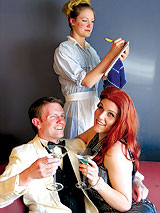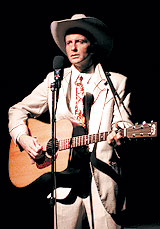
Manhattan martini memoir: Asheville Community Theatre presents a swingin’ ’60s romp with Bachelor Pad.
|
“The old-fashioned music still appeals to the child in us,” says playwright and director Ted Swindley. On the eve of the premiere of his modern musical Bachelor Pad, he is mulling over the reason most of us (even if we’d never admit it) still have a soft spot for hyperactive, top-hat-and-cane, stop-on-a-dime-and-burst-into-song shows like Carousel, South Pacific and The Music Man.
“We think, ‘I can walk into this world, I can forget everything, I can be completely entertained,'” Swindley muses. “We love being charmed.”
Fans of musical theater can get their fix at this year’s Stoneleaf Theatre Festival, the second annual ten-day drama smorgasbord running May 26 through June 4. But, while there may be a tap dance, don’t expect any marching bands, singing felines or sailor suits: This is the next generation of musicals.
The modern musical
“It used to be that jazz standards were mainstream,” explains actor/director Christopher Lynn, who helms Asheville Arts Center’s latest production, The Last Five Years. “That evolved [through] musical theater so that [jazz standards] became a genre instead of the genre.

As time goes by: The Asheville Arts Center gets intimate The Last Five Years.
|
“With the advent of Rent,” he explains, “musicals became more personal, not as flashy with dance numbers. The Last Five Years is one of those — it’s more accessible to people who like movies and drama but don’t want to stop for a big orchestra.”
Lynn’s project is described as a song cycle — a group of tunes related by a theme — that tells the story of a marriage. Here’s the hook: Last unfolds both backward and forward. “It makes your mind work,” he notes. “In a smaller theater, [the two characters] are right there — they’re your buddies, they’re your friends. It’s very rich.”
And intimate — which, for many playwrights, is the direction the modern musical is heading. “They’ve changed with the times,” Lynn insists. “The British invasion like Les Miserables stayed on Broadway so long, they became the norm. Musical theater has responded with smaller, intimate shows like Avenue Q. They’re edgier, they’re visceral, they’re what’s happening today.”
Interestingly, what’s “today” tends to involve a good deal of nostalgia. Lost Highway, performed by Southern Appalachian Repertory Theatre, is a retrospective of late country great Hank Williams, Sr.

Too many parties and too many pals: SART remembers Hank Williams in Lost Highway.
|
“They’re called jukebox shows,” SART Interim Managing Director Deborah Austin says. “It’s the phenomenon of taking a body of work and making it into a show, and now it’s come around to country music.” As in last year’s film Walk the Line and the popular musical Always … Patsy Cline (written by Bachelor‘s Swindley).
“[This is] a bittersweet look at [Williams’] life,” Austin says. “The playwright doesn’t ignore the fact that [Williams] burned himself out.”
And, she adds, Lost has crossover appeal. “It can [reach] fans who don’t necessarily like country music or musical theater.” Austin attributes this, in part, to the fact that unlike traditional musicals where characters drop everything to launch into song, all the lyrics of Lost are confined to a performance setting.
“It’s believable because so much of Hank Williams’ life was on stage,” she maintains. “The old musicals work, but we as an audience must join in with our imaginations in believing someone could break out and sing ‘Oklahoma!'”
They’re playing our song
However, just because it’s modern doesn’t mean a musical has to be all angsty. In fact, it seems the genre’s only rule these days is that music must fit into the equation.
But how that happens is wide open.
“Cabaret is a specific art form meant to give you the freedom to comment,” offers Serena Ebhardt, who, with husband David zum Brunnen, makes up EbZb Productions out of Raleigh. “The original German cabaret was a safe way to comment [politically]. There’s a way to put across your point of view in an art form; this is a direct communication with the audience.”
Ebhardt and zum Brunnen created their cabaret show, War Bonds: The Songs and Letters of World War II, a couple years ago, basing it on letters zum Brunnen’s father had saved from his service in WWII. “Since that time, it’s been so much larger than us … we continue to get letters and memoirs from WWII survivors,” zum Brunnen reveals.
“Sometimes we’ll be in a town where the presenters will have collected letters and we’ll present one during the show,” Ebhardt adds. And along with these written memories are, of course, songs.
“I’d always wanted to do a cabaret,” Ebhardt admits. “In this case, the songs are so based in the lyrics, and I’m a word person. I so love the songs of this era.”
She continues: “We didn’t write the show as a political statement — but many kids immediately draw the parallel between WWII and the Iraq war. It’s interesting, because the songs are so lighthearted — lots of fun, lots of humor.”
Like Austin, Ebhardt and zum Brunnen feel today’s audiences are less willing to suspend disbelief when it comes to no-holds-barred tune-bellowing — but instead of watching the genre fade, they’re witnessing an evolution. “In musicals, you get both the words and the music to express something to the audience,” says Ebhardt.
“I don’t think the popularity of the American musical went away,” zum Brunnen concludes. “Maybe the appeal has even broadened.”
Campy is not a crime
Which brings us back to Swindley, whose newest venture, Bachelor Pad, does its inaugural run at Asheville Community Theatre. “By a fluke I wrote Always … Patsy Cline, and when I developed that show, I really fell in love with the musical form,” he relates. “I’ve learned from doing Patsy and from years of directing and from being Southern an awful lot about storytelling. What I do first and foremost is tell a good story.”
Bachelor, based on the short story “Pete and Anna” by New York Times columnist William Safire, is a glimpse into the life of a young Manhattanite, circa 1966. Bachelor Pete, a slob, has a Hungarian housekeeper with whom he communicates by notes — the notes making up the material of the play. The catch? Pete assumes his employee is a matronly woman, when, in fact, she’s a lissome young bird. Cue the song and dance.
“Being a child of the ’60s, I’ve always loved that music,” Swindley says. But don’t imagine a Beatles soundtrack or the entreating harmonies of the Fifth Dimension. Think, instead, “The Girl From Ipanema,” “Fever” and “The Look of Love” — “a wonderful sexy and naughty side of the ’60s,” as Swindley hears it.
His challenge, he feels, is in “[getting] the audience excited about hearing the music they already know.
“This,” he says, “is a new old musical.”
And it works, claims the playwright, because it offers audiences what they love. “Romance, comedy — they may be considered cheesy moments, but we still want them.”


Before you comment
The comments section is here to provide a platform for civil dialogue on the issues we face together as a local community. Xpress is committed to offering this platform for all voices, but when the tone of the discussion gets nasty or strays off topic, we believe many people choose not to participate. Xpress editors are determined to moderate comments to ensure a constructive interchange is maintained. All comments judged not to be in keeping with the spirit of civil discourse will be removed and repeat violators will be banned. See here for our terms of service. Thank you for being part of this effort to promote respectful discussion.